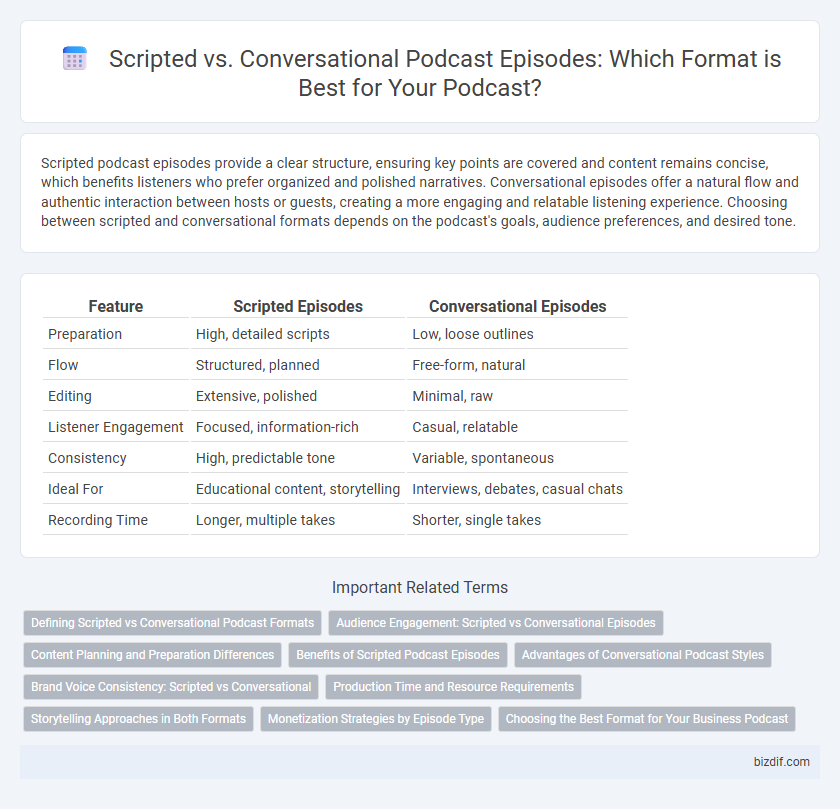Scripted podcast episodes provide a clear structure, ensuring key points are covered and content remains concise, which benefits listeners who prefer organized and polished narratives. Conversational episodes offer a natural flow and authentic interaction between hosts or guests, creating a more engaging and relatable listening experience. Choosing between scripted and conversational formats depends on the podcast's goals, audience preferences, and desired tone.
Table of Comparison
| Feature | Scripted Episodes | Conversational Episodes |
|---|---|---|
| Preparation | High, detailed scripts | Low, loose outlines |
| Flow | Structured, planned | Free-form, natural |
| Editing | Extensive, polished | Minimal, raw |
| Listener Engagement | Focused, information-rich | Casual, relatable |
| Consistency | High, predictable tone | Variable, spontaneous |
| Ideal For | Educational content, storytelling | Interviews, debates, casual chats |
| Recording Time | Longer, multiple takes | Shorter, single takes |
Defining Scripted vs Conversational Podcast Formats
Scripted podcast episodes follow a pre-written script designed to deliver precise messages, ensure structured storytelling, and maintain consistent pacing, often ideal for narrative-driven or educational content. Conversational podcast episodes feature spontaneous dialogue between hosts or guests, offering authentic, unscripted interactions that foster a relaxed and engaging listening experience. Choosing between scripted and conversational formats depends on the podcast's goals, desired tone, and audience expectations for either polished delivery or natural conversation.
Audience Engagement: Scripted vs Conversational Episodes
Scripted podcast episodes provide structured content that ensures clarity and precise messaging, which appeals to audiences seeking informative and well-organized narratives. Conversational episodes foster a spontaneous and authentic listening experience, enhancing audience engagement through relatable dialogue and dynamic interaction. Listener retention often improves in conversational formats due to their natural flow, while scripted episodes attract audiences valuing depth and expert insights.
Content Planning and Preparation Differences
Scripted podcast episodes require detailed content planning with pre-written scripts that ensure precise messaging, consistent pacing, and tightly controlled topics, benefiting episodes focused on storytelling or education. Conversational episodes emphasize flexible preparation, focusing on key discussion points or questions that maintain natural dialogue and spontaneous interaction, ideal for interviews or roundtable formats. The choice between scripted and conversational formats significantly impacts research depth, rehearsal time, and overall production workflow.
Benefits of Scripted Podcast Episodes
Scripted podcast episodes offer precise messaging and structured storytelling, enhancing listener engagement and content clarity. They enable hosts to carefully craft key points, ensuring consistent delivery and reducing filler speech, which improves overall episode professionalism. This format is particularly beneficial for educational, narrative, or branded podcasts aiming for a polished and impactful listener experience.
Advantages of Conversational Podcast Styles
Conversational podcast styles foster genuine and dynamic interactions, making content feel more authentic and engaging for listeners. This format allows hosts to adapt topics spontaneously, creating a natural flow that mirrors real-life discussions and enhances audience connection. Listeners often appreciate the relaxed tone and relatable dialogue, which can increase retention and encourage loyal followership.
Brand Voice Consistency: Scripted vs Conversational
Scripted episodes ensure precise brand voice consistency by maintaining controlled language, tone, and messaging tailored to the brand's identity, reducing the risk of off-brand statements. Conversational episodes offer a more natural and authentic feel but can lead to variations in tone and message delivery, potentially diluting brand voice. Brands seeking consistent audience perception favor scripted formats to uphold clear, recognizable communication aligned with their core values.
Production Time and Resource Requirements
Scripted podcast episodes demand extensive pre-production efforts, including detailed writing, rehearsals, and precise editing, resulting in longer production times and higher resource allocation. In contrast, conversational episodes typically require less scripting and post-production, allowing for faster turnaround and reduced staffing needs. Choosing between these formats impacts budget planning and scheduling due to differing production workflows.
Storytelling Approaches in Both Formats
Scripted podcast episodes employ carefully crafted narratives and structured dialogue to deliver precise storytelling, ensuring a clear plot progression and consistent pacing that enhances listener engagement. Conversational episodes use spontaneous dialogue and authentic interactions between hosts or guests, creating an immersive and relatable storytelling experience that fosters connection and emotional resonance. Both formats leverage unique storytelling techniques to captivate audiences, with scripted episodes emphasizing narrative control and conversational episodes prioritizing organic flow and listener intimacy.
Monetization Strategies by Episode Type
Scripted podcast episodes offer consistent storytelling, attracting sponsors seeking reliable brand alignment, which often leads to higher CPM rates for advertisements. Conversational episodes enable organic integration of products through host endorsements, enhancing listener trust and boosting affiliate marketing success. Monetization strategies should align with episode style to maximize revenue, leveraging scripted content for branded ads and conversational formats for dynamic sponsorship deals.
Choosing the Best Format for Your Business Podcast
Choosing the best format for your business podcast depends on your goals and audience preferences, with scripted episodes offering structured content and precise messaging ideal for formal topics. Conversational episodes foster authenticity and engagement through natural dialogue, making them suitable for storytelling and building rapport with listeners. Analyzing listener feedback and aligning the format with brand voice enhances content effectiveness and audience retention.
Scripted episodes vs Conversational episodes Infographic

 bizdif.com
bizdif.com